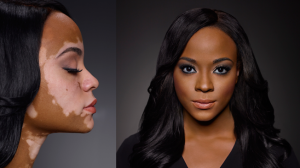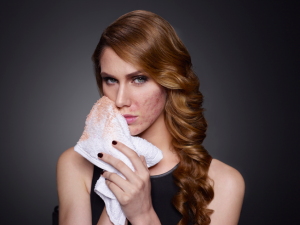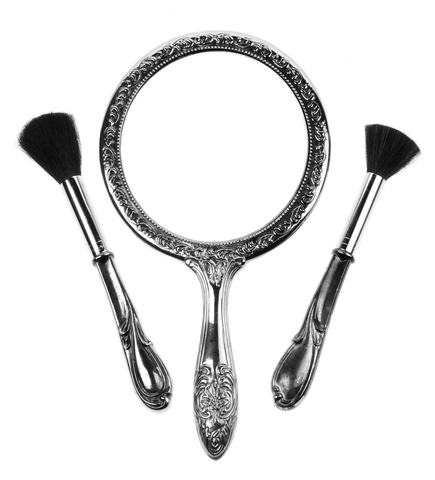“I’m inviting you to blend in to stand out.”
Cheri Lindsay for Dermablend (www.adweek.com)
This is what Cheri Lindsay says in her testimonial for Dermablend camouflage makeup, whose adverts have been getting a lot of attention for their visually surprising and emotional accounts of using camouflage makeup to cover skin conditions. Lindsay’s statement is obviously a pun, on blending in makeup rather than – or as well as? – blending in socially, but I still take issue with it. **Not with Dermablend or their camouflage makeup, but with the wider idea as it works in cosmetics advertising.** I mean, really: blending in to stand out? And I’m going to get academic on its ass.
(Pulp Fiction http://www.ugo.com)
The key idea behind this advertising campaign is that of the True Self. Buy this product and reveal your True Self – to yourself and the rest of the world. In Dermablend’s other advert, model Cassandra Bankson, who has acne, says, “I used to use makeup to cover up, and to hide who I was. Now I use it to express myself, and to show the world who I truly am”. I sense a contradiction here: covering up to reveal your True Self?
The same logic as in Lindsay’s statement is at work here – buy this product and find your True Self – or as Michelle M. Lazar puts it, advertisers “link the normative practice of beautification with an emancipated identity” (“The Right to be Beautiful” p.37). Normative = telling us what to do, which the beauty industry certainly does. And cosmetics adverts link this pressure to do beauty work with the idea that the product will set us free from skin imperfections and self-consciousness, to be who we really are: that’s the “emancipated identity”, or the True Self.
The logic of the True Self has been used throughout the growth of consumer culture, since to make people buy something you have to make them feel that they’re “worth it”. Or that they need it. So we have been persuaded that the things we choose to buy define and express who we are: adverts then tap into who we want to be. That’s the logic of capitalism all over: it’s everyone for themselves, and if you can construct the most attractive, skilled and likeable Self then you will be successful.
And we definitely need perfect skin to do that, right?
Apparently so. Cassandra Bankson says in her testimonial, “We think that to be successful we have to be a certain way, when in reality, in order to be successful and happy, all we have to do is be ourselves.” But is that the Self who has acne, or the Self who appears not to have acne because she’s wearing a really great foundation? And is that really what defines Bankson’s True Self – her skin?
Cassandra Bankson for Dermablend (www.adweek.com)
Don’t get me wrong, I would never take issue with camouflage makeup to cover up skin conditions. I am concerned with the extension of this idea to all skin ‘imperfections’, because Dermablend’s adverts imply that the only way to reveal your True Self is to have unrealistically perfect skin. It makes sense when Cheri Lindsay says that her makeup helps “people to look through the initial shock” of her skin condition “and see who I was as a person”, so that she can go through life being asked about her work or her interests rather than being asked what’s wrong with her face. Absolutely. But does that extend to everyone who has a couple of spots and slightly uneven skin tone (something I suspect was just invented by cosmetics advertisers)? No: in that case it suggests that you aren’t a proper person unless you have PhotoShop-perfect skin. I don’t feel that is helpful to my True Self. Or any of my other Selves, who are feeling a bit inadequate now.
Lazar writes that “the freedom to be beautiful is implicitly set against the ‘tyranny of ugliness’” (p.40) and I think we can all understand how it is possible to feel trapped in an unattractive body. I think the emotional power of Dermablend’s ads draws on this. Cosmetics give us the freedom to change the way we look, to express rebellion or sweetness, softness or power, and this is no bad thing. As Geoffrey Jones says in Beauty Imagined: A History of the Global Beauty Industry, “the mass production of beauty has been a force for the democratization of personal aesthetics … it granted to every man and woman new powers of self-reinvention” (p.275). I agree that this is a liberty, and a good one.
It becomes less good, though, when beauty is no longer a choice: Marlis Schweitzer writes that since around 1911, advertisers have “preached that it was not only possible for all women to be beautiful, but it was also every woman’s responsibility to be beautiful” (“The Mad Search for Beauty” p.136). Spreading this attitude is, of course, a very good way of selling cosmetics – creating a need and then supplying the solution, another basic principle of capitalist economics. And it is no coincidence that the rise of this “responsibility to be beautiful” happened at the same time as the rise of consumer culture and also of testimonial advertising, of which the cosmetics industry has always been “one of the most active and innovative exponents” (Schweitzer p.135). Now we’re under the tyranny of beauty.
(Les Dolgatsjov, http://www.viscoimages.com)
What all this means is that Dermablend’s claim to liberate us from unattractive skin in order to reveal our True Selves is not the answer to a natural human problem. It’s the result of a hundred years of capitalism in which beauty has been constructed as the only way for women to become successful and happy, and the idea of a True Self has been created as a way of selling us stuff. What is a True Self anyway?
Or am I taking that too far?
After all, Dermablend’s camouflage makeup is intended for skin conditions like Bankson’s and Lindsay’s, so that they can go about their business without being mocked or stared at, which is great.
But. They’re still “inviting” us to “blend in to stand out”. To be normal, to be indistinguishable from others, so that we can, er, “stand out” in some unspecified way. We’re all under the tyranny of the normal, and are mocked and rejected if we stray too far from the standard. That’s what Dermablend is offering: to make you normal. In this case, to judge by Bankson and Lindsay, ‘normal’ is beautiful, so we seem to have come back round to the same old problem, that women are just not allowed to be anything other than beautiful – and this is one narrow definition of beauty.
My True Self has gone to plan a revolution. She isn’t wearing foundation.
References:
Jones, Geoffrey. Beauty Imagined: A History of the Global Beauty Industry. Oxford and New York: Oxford University Press, 2010.
Lazar, Michelle M. “The Right to be Beautiful: Postfeminist Identity and Consumer Beauty Advertising”. In New Femininities: Postfeminism, Neoliberalism and Subjectivity. Rosalind Gill and Christina Scharff, eds. Basingstoke: Palgrave Macmillan, 2011.
Schweitzer, Marlis. “‘The Mad Search for Beauty’: Actresses, Cosmetics, and the Middle-Class Market”. In Testimonial Advertising in the American Marketplace: Emulation, Identity, Community. Marlis Schweitzer and Marina Moskowitz, eds. New York: Palgrave Macmillan, 2009.





